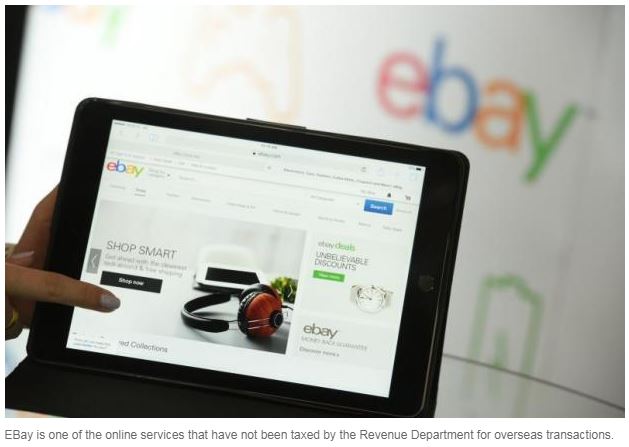Thailand: Dozens of foreign firms forecast to get on VAT train
The Revenue Department anticipates that 80-100 large foreign-based digital platform operators that render services to Thai consumers will sign up as value-added tax (VAT) registrants in Thailand after the e-business tax comes into force.
These foreign e-business operators, dominating 80-90% of Thailand’s e-business service value, will be willing to register for VAT payment to avoid tarnishing their corporate governance image, said Patricia Mongkhonvanit, principal adviser on strategic tax administration at the Revenue Department.
The cabinet on Tuesday approved an amended Revenue Code related to VAT collection on e-business operators with a physical presence outside of Thailand but earning income here.
Under the amended code, foreign-based digital platform operators providing services, including online games, sticker downloads, online advertisements, digital content and online hotel bookings to Thai consumers are liable for VAT.
These online business operators are required to sign up for VAT payment through the Revenue Department’s online system within 30 days of the law taking effect if their income in Thailand exceeds 1.8 million baht a year.
For hotel booking sites, VAT will be charged based on service, not accommodation, fees.
She estimates that VAT collected from foreign online business platform providers would contribute 3 billion baht a year to the government’s coffers.
VAT collection for foreign online business operators, expected to come into force this year, is aimed at creating a level playing field for local digital platform service providers as they are now subject to the tax if their annual online business income exceeds 1.8 million baht.
To determine whether foreign-based digital platform providers are correctly paying VAT incurred from income earned in Thailand, the Revenue Department will require local operators who use or purchase their services to report such transactions.
Local operators are prohibited from claiming expenses incurred from buying products or services from non-VAT registrants in Thailand as tax deductible expenses, Mrs Patricia said.
Members of the Organisation for Economic Cooperation and Development have introduced VAT on goods and services purchased online, and 50 countries now impose such a tax.
For the planned revocation of the VAT exemption for online shopping of goods worth less than 1,500 baht bought from foreign vendors outside of Thailand and shipped by mail, the Revenue Department is studying the issue.
The VAT exemption waiver needs to be studied because it could hurt the trade ecosystem, Mrs Patricia said, adding that it was essential to think about how to handle VAT payments if such an exemption was scrapped, as more than 100,000 parcels a day are gathered at Laksi Post Office before being shipped.
Purchases from foreign e-commerce vendors outside of Thailand are subject to 7% VAT if value exceeds 1,500 baht, but many online operators exploit the loophole by breaking up invoices into amounts below the threshold to skirt the levy.
“The government needs to collect VAT, as Thais are estimated to spend tens of billions of baht for cross-border digital services and shopping,” said Pawoot Pongvitayapanu, former president of the Thai E-commerce Association and founder of Tarad.com.
There are 11 categories of online services not taxed by the Revenue Department, as money paid by Thais is directly sent abroad.
These are e-commerce businesses such as Amazon and eBay; media and advertising players like Google, Facebook and Line; marketing and other services including Evernote; transport providers such as Grab and airlines; travel platforms like Agoda, Booking.com and Airbnb; Digital content providers like Netflix, Joox and Spotify; software and apps from Apple and Microsoft; games; infrastructure like Amazon Cloud, Microsoft Cloud and Google Cloud; financial services likes PayPal; and gambling.
“The VAT collection for foreign online operators is a good starting point to help Thailand earn tax revenue from foreign-based digital service providers and is in line with consumer behaviour, as they tend to shop more online in the digital age,” Mr Pawoot said. “Such VAT collection could have some side effects but is worthwhile to prevent the country from losing revenue overseas. Thais need to admit that the VAT payment is not for themselves but for our country.”
The Revenue Department can cooperate with the Bank of Thailand to track payments for overseas online services and product purchases from credit and debit cards, he said. Companies in Thailand can help withhold the 7% VAT and remit it to the Revenue Department before paying to foreign online service providers.
Countries like Australia and Japan require VAT payment for online services, while India imposes a 6% withholding tax.
Phensiri Sathianvongnusar, chief executive of aCommerce Thailand, Southeast Asia’s leading e-commerce solution firm, said the e-commerce tax is aimed at levelling the playing field between offline and online players.
The VAT collection on foreign-based digital platform providers will be a boon to traditional vendors, she said.
Source: https://www.bangkokpost.com/business/news/1506014/dozens-of-foreign-firms-forecast-to-get-on-vat-train


 English
English




